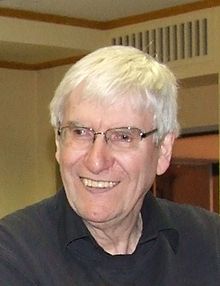Keith Johnstone
Keith Johnstone (born February 1933 in Devon ) is a British dramaturge living in Canada , a founder of modern improvisational theater and acting teacher.
Life
Keith Johnstone worked from 1956 to 1966 as a dramaturge, director and studio manager at the Royal Court Theater in London . Here he ran an author's workshop that included the playwrights John Arden , Edward Bond and Arnold Wesker . Johnstone also taught at the Royal Academy of Dramatic Art . Because of negative experiences during his own training, he tried to encourage his actors to be more spontaneous by negating all the rules he had learned in his training. For example, he encouraged them to make faces on stage and playfully get angry; he heckled her telling her not to concentrate, not to think, and to do the obvious. When he saw that these techniques were successful - the actors played more freely and with more joy - he developed basic theater rules from them.
Inspired by the theses of the British behaviorist Desmond Morris , Johnstone developed the theory that stories are about dominance and submission and that the characters in the story must mutually change. He believes that a lot of comedic material comes from the many small ways people try to raise their own social status and lower that of their counterparts. In the following years this conception spread rapidly and is now widespread in the theater world.
In the 1970s Johnstone moved to Calgary . In a basement of the University of Calgary he went public with the theater sport he developed in the Secret Impro Theater . Together with veterinarian Mel Tonken, Johnstone founded the Loose Moose Theater Company, which is located at the southern end of Calgary Airport. As a form of modern improvisational theater, the term theater sport is legally protected by the copyright symbol ©. Johnstone is a full professor at the University of Calgary.
Acting technique
In dramatic acting education, learning to play with status is central. According to Johnstone, for free improvisation only one thing is needed: the performers have to be aware of their status, the other circumstances do not have to be given. For Johnstone, status is what you do and not necessarily the same as social status. For example, a tramp (low social status) who molested a duchess (high social status). The tramp plays, contrary to his status, high, the Duchess, contrary to her status, humiliated.
Three status players can be distinguished after Johnstone:
- The high status player
- The low status player
- The status expert
The status expert can adapt his actions and behavior. That is, he can lower or raise the status himself. The status changes are never extreme, but always a little bit above or below. For Johnstone, the seesaw is an important element in the game, as two partners alternately upgrade and downgrade each other. Status experts are required to keep the seesaw in the flow. High and low status are thus characterized by the modulation of linguistic, gestural and facial attitudes.
Likewise the relationship between status and space. According to Keith Johnstone, the movement of a protagonist is related to space. Every movement of the body changes the space. Johnstone gives the example of a man who sits on a bench and changes both status and space by changing body position. Its space increases, decreases, flows to the left or to the right, and with it the status also changes.
Publications
-
Impro - Improvisation and the Theater. Methuen Publishing, London 1979, ISBN 0-413-46430-X
- German edition: improvisation and theater. Translated from the English by Petra Schreyer. Afterword by George Tabori . Alexander, Berlin 1993, ISBN 3-923854-67-6
-
Impro for Storytellers: Theatresports and the Art of Making Things Happen. 1999, Faber & Faber, ISBN 0571190995
- German edition: Theater plays. Spontaneity, improvisation and theater sports. Translated from the English by Christine and Petra Schreyer. Alexander, Berlin 1998, ISBN 3-89581-001-0
- Introduction to Michael Shurtleff : Audition successfully. Alexander, Berlin 1999, 5th edition 2009, ISBN 978-3-89581-044-2
- How my wife went mad Stories & Plays . Alexander, Berlin 2009, ISBN 3-89581-208-0
Web links
- Keith Johnstone in the Internet Movie Database (English)
- Literature by and about Keith Johnstone in the catalog of the German National Library
- Homepage Keith Johnstone
Individual evidence
- ^ Keith Johnstone: Improvisation and Theater. Alexander, Berlin 1995, p. 2
- ^ Keith Johnstone: Theater plays. Spontaneity, improvisation and theater sports. Alexander, Berlin 1998, p. 563.
- ^ Keith Johnstone: Theater plays. Spontaneity, improvisation and theater sports. Alexander, Berlin 1998, p. 26f.
- ^ Keith Johnstone: Theater plays. Spontaneity, improvisation and theater sports. Alexander, Berlin 1998, p. 565.
- ^ Keith Johnstone: Improvisation and Theater. 7th edition, Alexander Verlag, Berlin 2004, p. 57.
- ↑ Werner Gehrcke: Methods and Concepts of Acting - A tour through theory and craft. 1st edition, disserta Verlag, Hamburg 2015, p. 127.
- ↑ Werner Gehrcke: Methods and Concepts of Acting - A tour through theory and craft. 1st edition, disserta Verlag, Hamburg 2015, p. 128.
- ^ Keith Johnstone: Improvisation and Theater. 7th edition, Alexander Verlag, Berlin 2004, p. 96.
- ^ Keith Johnstone: Improvisation and Theater. 7th edition, Alexander Verlag, Berlin 2004, p. 99.
| personal data | |
|---|---|
| SURNAME | Johnstone, Keith |
| BRIEF DESCRIPTION | British dramaturge, acting teacher and inventor of modern improvisational theater |
| DATE OF BIRTH | February 1933 |
| PLACE OF BIRTH | Devon , England |
